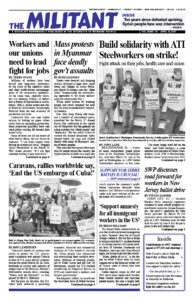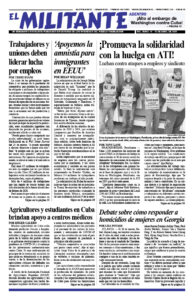For a decade now, working people in Syria have faced a social catastrophe since President Bashar al-Assad’s regime moved to crush a popular uprising for political rights in 2011. As civil war began, Washington and the rulers of Iran, Russia and Turkey intervened, each pursuing its own economic and political interests.
Over half a million have been killed. More than half the prewar population of 23 million were forced to flee from their homes. Many have been driven into camps in the northwest province of Idlib on the Turkish border, the last stronghold of organized forces opposed to the Syrian government.
Over 5 million are refugees in nearby countries. Bombed-out cities retaken by Assad’s forces are now wracked by severe shortages of bread and power.
Hundreds of thousands of working people courageously took to the streets against Assad in March 2011, drawing inspiration from struggles against hated dictatorial regimes in Tunisia, Egypt and elsewhere in the region.
But the working class, lacking a leadership capable of organizing an independent fight to take political power into its own hands, was pushed aside by capitalist forces, which formed armed groups to combat the regime. These ranged from former figures in Assad’s military to Islamists of different stripes.
Assad’s Baathist Socialist Party had postured for decades as a defender of the Arab peoples against Washington and other imperialist powers. In fact, it led a tyrannical government dominated by a layer of ruling families largely drawn from Syria’s Alawite Muslim minority who defended capitalist interests against working people. The Communist Party of Syria subordinated the struggles of workers and farmers to Moscow’s interests, collaborating closely with the Baathists.
As the fighting unfolded, part of Syria’s Kurdish population of 1.7 million moved to take control over the northeastern region of the country, where the majority of Kurds live. The over 30 million Kurds, divided between Syria, Turkey, Iran and Iraq, are the largest nationality worldwide without their own homeland.
Today, Assad’s forces, with decisive aid from Moscow’s air power and Iranian-backed militias on the ground, have regained control of two-thirds of Syria, much of it devastated.
U.S. military intervention
The administration of Joseph Biden, like previous administrations, is acting to defend the U.S. rulers’ interests in a region holding key oil reserves, trading links and military bases.
U.S. airstrikes in Syria Feb. 25 killed 22 Tehran-backed militiamen after a missile attack on a U.S. base in Iraq that Washington blames on Tehran.
When the Syrian civil war began, Washington voiced tepid support for some of the groups fighting Assad, but did not intervene directly. When reactionary Islamic State seized parts of Syria, the U.S. rulers unleashed airstrikes. Washington largely relied on the Kurdish People’s Protection Units (YPG) to do the fighting that drove out ISIS.
Washington continues to deploy 900 troops in the parts of Syria held by Kurdish-led forces, that included much of Syria’s oil resources. They are backed by tens of thousands of U.S. military personnel at bases in the Middle East.
The rulers in Russia and Iran also intervened in Syria, carrying out murderous assaults on Assad’s opponents that were decisive in propping up the teetering regime. The Iranian rulers military intervention in Syria, as well as in Iraq, Lebanon and Yemen, advanced that regime’s counterrevolutionary sway throughout the region. But it has also resulted in wider conflicts with working people at home, who have taken to the streets to protest the impact of Tehran’s expansionist course.
The Turkish government backed some of those fighting Assad in order to extend its own influence and to crush efforts by Syrian Kurds to establish their autonomy. Ankara fears that steps in that direction in Syria will embolden Turkey’s large Kurdish population.
Fighting continues. The Turkish government protested March 21 after Moscow’s jets hit a fuel depot and other targets in Idlib near crowded refugee camps. Assad’s artillery hit a hospital killing some civilians the same day.
This ongoing conflict has worsened conditions for working people across the region. It will continue until the class struggle internationally helps develop a leadership capable of advancing the independent interests of workers and farmers against capitalist exploitation and oppression.

